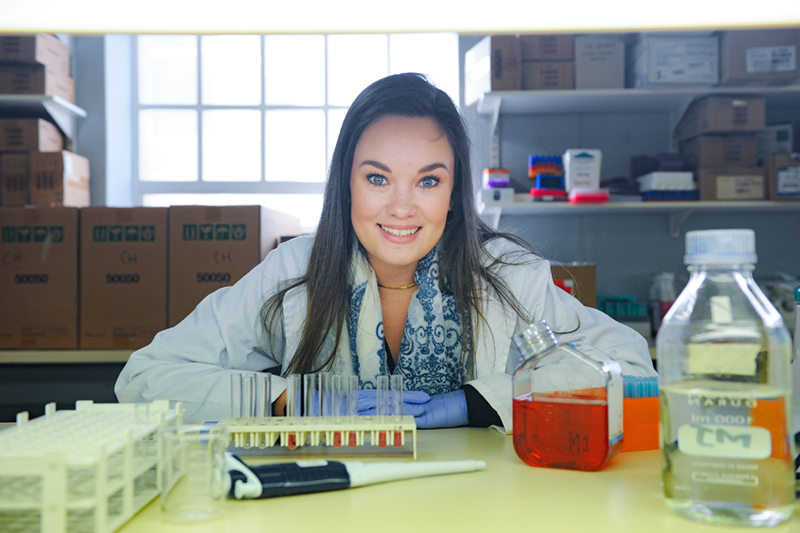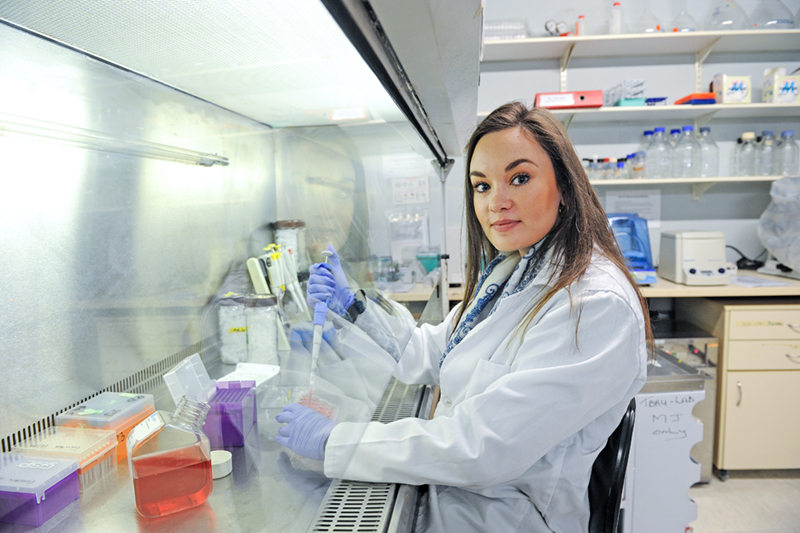‘Success is the sum of small efforts’
20 July 2022 | Story Niémah Davids. Photo Lerato Maduna. Read time >10 min.
In September 2021, as Maxine Höft was nearing the end of the fourth year of her PhD, the unthinkable happened. Her dad – her hero, number one supporter and best friend – passed away. As she battled to come to terms with his death, three months later, she lost her grandmother, and her world as she knew it came tumbling down.
“I went through the toughest time of my life. My world fell to pieces so quickly and so unexpectedly. I had to go back home to the Eastern Cape and pack up my dad’s house – the home I grew up in. I had to face life without my dad and my gran, and my reality that I had a PhD looming, one that I was so close to finishing,” Maxine said.
‘Broken and useless’
For four months, Maxine was “broken and useless”. In January this year, she almost gave up. She felt she needed more time to grieve, and she came close to extending her degree by another year. But her supervisor, Associate Professor Claire Hoving, encouraged her to keep going. Associate Professor Hoving provided the reassurance Maxine so desperately needed. Hoving committed to supporting her completely even if it meant reviewing her thesis chapters at short notice and with quick turnaround times.
With a heavy heart, and many late nights with tears streaming down her face, Maxine put pen to paper. Thankfully, she managed to complete and submit her thesis at the end of February. In June she got word that she had made the cut, and come 22 July, she will graduate with her PhD in clinical science and immunology from the University of Cape Town (UCT).
“All my efforts and everything I achieved as a result, I dedicate to my dad, Elwyn Walter Höft, and my gran, Rosemary Ann Raath.”
“All my efforts and everything I achieved as a result, I dedicate to my dad, Elwyn Walter Höft, and my gran, Rosemary Ann Raath,” Maxine said. “My dad has been jokingly calling me ‘Dr Höft’ since my honours year. I never imagined that he wouldn’t be standing cheering me on with tears in his eyes on my PhD graduation day. But I know that he will have his hand on my shoulder always and I will hear him cheer during all my victories for the rest of my life.”
A scientist by nature
Since a young age, Maxine was fascinated by science. She adored time in nature, and biology and science were her favourite subjects at school. It came as no surprise to her parents when she opted to enrol for a Bachelor of Science at Rhodes University when she matriculated. During her undergraduate degree she developed a strong interest and passion for microbiology and molecular cell biology and the medical aspect associated with these areas of study. Therefore, her honours in microbiology and master’s in biochemistry involved cancer research. Both degrees followed in quick succession.
Maxine completed her master’s at the end of 2016. With little idea of what to do next, she moved to Cape Town and started tutoring high school learners in science and biology to generate an income. But this role didn’t last very long. When she successfully applied for a joint national Department of Science and Technology and National Research Foundation internship based in the African International Centre for Genetic Engineering and Biotechnology in UCT’s Institute of Infectious Disease and Molecular Medicine, it was the start of something great. The internship paved the way to her PhD, which she formally started in 2018 in UCT’s Africa CMM Medical Mycology Research Unit.
“Research has taught me resilience, perseverance, critical thinking and undying problem-solving capabilities. Without life’s curveballs, a PhD is not an easy challenge to take on. It requires a specific emotional and academic intelligence, passion, a methodical approach and persistence. It is equally frustrating as it is rewarding,” Maxine said.
Ground-breaking research
The topic of Maxine’s dissertation was “Understanding the immune response to Emergomyces africanus”. Emergomyces species are a group of fungi that opportunistically cause disease among people with weakened immune systems. Emergomyces africanus is a newly discovered fungus within the Emergomyces group and was first identified at Groote Schuur Hospital in 2013. The disease affects people with advanced HIV and causes high fatality rates, especially in patients who don’t receive anti-fungal treatment. The true burden of disease in South Africa remains unknown. However, as diagnostic testing improved in recent years, the country recorded a dramatic increase in the number of reported cases.

The aim of Maxine’s research project was to better understand the immune response to the Emergomyces africanus fungus. She set out to identify key immune mechanisms which a healthy host (body) uses to fight and clear an infection, establish which of these responses are absent in an immunocompromised host and as a result could lead to invasive Emergomycosis and ultimately to death.
“Fungal infections kill an estimated 1.5 million people annually and the majority of deaths occur in Africa. Yet, fungi remain underestimated and research in this field is severely neglected. My PhD was an opportunity to understand an emerging disease endemic to South Africa and to identify key immune components that could be used to control this fungal pathogen,” Maxine said.
The findings
Maxine’s research results indicate that a T-helper 1 cell, also known as a CD4+ cell, mediates an immune response during Emergomyces africanus infection and identifies the main cytokine (a broad and loose category of small proteins that regulate inflammation and play a vital role in regulating the immune response in health and disease) and antibody responses to the infection.
“This work had laid the foundation to better understand Emergomyces and the study has added valuable insight into disease kinetics and fungal clearance mechanisms.”
Her research also highlighted the key cytokine immune response currently lacking in immunocompromised hosts. This, she added, may provide a possible explanation as to why people living with HIV/AIDS are suspectable to the infection. This process may also bring into focus other vulnerable patients at high risk of contracting the infection, which includes organ transplant recipients, cancer patients, and patients who receive high doses of corticosteroids and other immunosuppressive therapy.
“This work has laid the foundation to better understand Emergomyces and the study has added valuable insight into disease kinetics and fungal clearance mechanisms. From case study reports we see that people living with HIV/AIDS are far more likely to develop serious symptomatic and disseminated Emergomyces disease,” she said. “Our model could also be further exploited to look at new avenues for therapy. Research focusing on immune therapy and possible vaccine development will have a tremendous impact on the treatment and management of the disease.”
Where to from here
Many of Maxine’s peers have already relocated abroad to pursue postdoctoral fellowships at various universities. But her feet are firmly planted on South African soil. After all, she pointed out that Africa bears the highest burden of poverty-related and neglected infectious diseases, and desperately requires the skills of clinicians and researchers in the field.
“Africa and South Africa depend heavily on research findings from first-world countries where their healthcare challenges are incomparable to ours and their population demographics are vastly different. Our country is burdened by infectious diseases that are not encountered in many developed countries, and we desperately need to build capacity of home-grown medical researchers to lead our battle in tackling our country’s healthcare challenges,” she said.
Maxine will continue her postdoctoral research at UCT and plans to engage with various laboratories and collaborators to gain clinical research experience to equip herself with the knowledge she needs to help tackle some of the biggest health challenges that South Africans and Africans face.
“Having more researchers in the neglected fields of medical mycology and fungal immunology, who can make government and funders aware of the serious fungal pathogens infecting those who are HIV positive will contribute toward reducing the mortality rate among HIV-positive and immunocompromised people, especially those in developing countries. We need better diagnostic tools and better treatment, and I want to contribute,” Maxine said.
Wise words of advice
Reflecting on her journey, Maxine said a quote by Robert Collier helped her through many dark days, when all she wanted was to give up on her dream: “Success is the sum of small efforts, repeated day in and day out.” By pasting the quote on her wall it reminded her of her progress.
“I have since taken comfort in accepting that tough times will always be inevitable in our lives. But it’s how we respond to them that defines our future. I have found that there can be a weird symbiotic relationship between painful experiences and achieving your goals. Working towards a goal can give you purpose during a time when you might have little hope,” she said.
With a chuckle, she reminded current, and the incoming cohort of undergraduate and postgraduate students, that while her journey to her PhD was filled with many hurdles, there were many highs too. She said she especially loved returning to a university setting to conduct research in an area she loved and was delighted when during the height of the COVID-19 pandemic she was presented with an opportunity to write a full chapter in a Springer Nature textbook.
“I’d like people to remember that there is always light at the end of the tunnel.”
“Writing the chapter was daunting but was one of the most rewarding experiences of my life. It was such a highlight and a real silver lining during a time when I felt so much was lost during a critical time of my PhD. So, it wasn’t all bad, and I’d like people to remember that there is always light at the end of the tunnel. Stay strong and be prepared to grab the opportunity that awaits you,” Maxine said.
 This work is licensed under a Creative Commons Attribution-NoDerivatives 4.0 International License.
This work is licensed under a Creative Commons Attribution-NoDerivatives 4.0 International License.
Please view the republishing articles page for more information.
Research & innovation





































